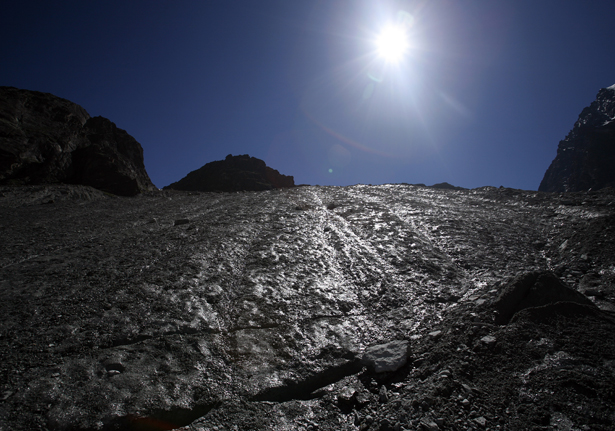
Water flows from a melting glacier in the Swiss Alps in Arolla, near Sion. REUTERS/Denis Balibouse
Celebrated every April 22 for the past forty-two years, Earth Day is showing its (middle) age. Instead of rallying public pressure for far-reaching reforms, Earth Day is becoming, at least in the United States, a bland, tired ritual that polluters and politicians have learned to ignore or co-opt. This year, for example, Monsanto has plastered ads at bus and subway stops in Washington, including at the entrance to the Agriculture Department, boasting about how the giant manufacturer of pesticides and genetically modified seeds has helped America’s farmers become better environmental stewards—despite Monsanto’s record of suing organic farmers for patent infringement after winds blew its seeds onto the farmers’ fields.
Frustrated by such cynicism, some environmentalists have called for abolishing Earth Day. But that would be throwing the baby out with the polluted bathwater. Instead, why not recall the real history of Earth Day and revive its original—and much more demanding—vision?
Organized in 1970 by Senator Gaylord Nelson and activist Denis Hayes, the first Earth Day so frightened president Richard Nixon that he decided he had to become an environmental president if he wanted to win a second term. And unlike later presidents who invoked that title, Nixon lived up to it. He created the Environmental Protection Agency, which today’s Republicans love to demagogue. His aides pioneered such transformative measures as environmental impact reports and regular pollution monitoring. And he signed landmark environmental laws—the National Environmental Policy Act, the Clean Air Act, the Clean Water Act, the Endangered Species Act and more—that on paper are still among the strongest in the world (indeed, that have been the model for the rest of the world’s environmental laws).
Nixon did all this not because he was a closet tree-hugger—the poor man wore wingtips to walk on the beach—but because he was a calculating politician. As Russell Train, the first chair of the White House Council on Environmental Quality, and other aides later revealed in their memoirs, Nixon was keenly aware that 20 million Americans—roughly 10 percent of the population in 1970—took some kind of civic action that first Earth Day, whether it was planting trees, cleaning creeks, teaching kids or joining demonstrations. Coming in the wake of consciousness-raising by such writers as Rachel Carson and Barry Commoner and activism by Ralph Nader and antiwar and civil rights movements, this outpouring of citizen engagement led Nixon to conclude that the environment was emerging as a major public issue—one that Democrats could use against him in the 1972 election. So Nixon pre-empted that possibility by taking environmental action himself.
In short, America’s first and biggest environmental victories were won after mass grassroots activism persuaded an otherwise indifferent president that he had to deliver or risk losing his job. Alas, this history seems to have been forgotten by many of today’s green activists, to say nothing of ordinary citizens. How else to explain why, under President Obama, large environmental groups spent an estimated $100 million to $300 million on a doomed inside-the-Beltway effort to pass carbon cap-and-trade legislation? Doomed, because cap-and-trade had zero grassroots support. “We can’t go out in the streets about cap-and-trade,” one campus activist complained. “Most people can’t even understand it.” And without grassroots pressure, the structural bias of official Washington, where big money dominates much more than in Nixon’s era, is all but impossible to counter.
Popular
"swipe left below to view more authors"Swipe →
Of course, the power of big money in Washington must be limited, but in the meantime it can also be overcome by strong pressure from below. Grassroots activism, after all, is what produced the two biggest climate change victories: the recent delay of the Keystone XL tar sands pipeline and the de facto moratorium imposed over the past decade on building coal-fired power plants.
But Barack Obama’s “All of the Above” energy policy—including a reconsideration of the Keystone pipeline—illustrates that America’s environmentalists still have not mustered enough grassroots pressure to persuade this president to show the kind of leadership needed to preserve a livable climate. All of the Above, let’s remember, is a slogan Republicans coined to make their slash-and-burn philosophy more palatable to moderate voters. It sounds more reasonable than “Drill, baby, drill!” but amounts to much the same thing. To give President Obama his due, his promotion of wind and solar energy and his ordering of higher vehicle fuel efficiency are laudable steps. But when he brags, as he did at a recent campaign event while posing in front of vast stacks of oil pipes, that his administration has “added enough new oil and gas pipeline to encircle the Earth” while also increasing oil drilling to record levels, Obama forfeits whatever credibility he once had as a politician who cares about the looming catastrophe of climate change. All of the above also violates Obama’s promise, at the 2009 Copenhagen climate summit, to reduce US greenhouse gas emissions to what amounted to a scientifically paltry 5 percent by 2020 compared to 1990 levels. But apparently the president feels he can get away with such betrayals without paying much of a political price.
Overturning Obama’s calculation is not possible for Earth Day 2012, but there is still time before November to give Obama, his Republican opponent and all Congressional candidates their own Nixon moment. As on that first Earth Day, we need millions of Americans to stand up and take action, risks and political scalps. As climate crusader Mohamed Nasheed, the deposed Maldives president, told The Nation recently, “You need to put a million people in the streets to show politicians you are serious.” Which means that environmentalists can succeed only if the rest of us join in. To quote the gentle and plain-spoken environmentalist Dr. Seuss, writing just after the first Earth Day in The Lorax, “Unless someone like you cares a whole awful lot, nothing is going to get better. It’s not.”


